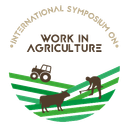INTERNATIONAL SYMPOSIUM ON WORK IN AGRICULTURE 2016
Final Program
Inscrições (participantes do Brasil) / Registration (foreign participants)
State University of Maringá (Parana, Brazil)
Visit to COPAVI
 |
| Got interested on SWA Day Trip? Click here! |
Last July 21st, Julio Cesar Damasceno, Marino Eligio Gonçalvez and Sandra Mara Schiavi Bánkuti, professors at the State University of Maringá (UEM) and members of the organizing committee for the International Symposium on Work in Agriculture (SWA), visited COPAVI (“Cooperativa de Produção Agropecuária Vitória”). COPAVI is a cooperative formed by farmers at an Agrarian Reform Settlement in Paranacity, in the northern portion of Paraná. Their current main products are those from sugarcane production (brown sugar, cachaça and syrup) and dairy (fluid milk and yoghurt), distributed in national and international markets. COPAVI is a national example of collective work organization and agro ecological production system in Agrarian Reform Settlements in Brazil, and is one of the locations to be visited during our SWA day trip, on November 11th.
|
|
|---|
Introduction
According to the World Bank, agriculture is the largest employer in the world: it concerned 30% of the working population in 2010. Although in relative reduction (38% in 2000), the number of farm workers is increasing because of population growth and now exceeds a billion people.
Relations between capital and labor, family and paid workers, and more widely, forms of work organization (taylorism, delegation, mutual aid and co-operation) crystallize around standard models of “farming systems” combining a variety of productive ambitions, degrees of mechanization/automation and forms of labor organization:
-
“high tech” models with high work productivity where the farmer and highly-skilled employees analyze and interpret increasingly more precise information systems on crop and animal productions,
-
models favoring family-run agroecology, sometimes with paid workers and mutual aid, turned towards local food circuits,
-
agribusiness models on a very large scale, delegating the planning of rotations and technical operations to agricultural work enterprises and agronomic engineers,
-
subsistence community farming models with sales of surplus.
These models only represent the extremes, as the majority of farms borrow more or less from one or other of them, but they help thoughts about diversity.
Transformations of farming systems are marked by increasingly important challenges regarding the environment and food safety, and by the dynamics of sectors subjected to requirements of quality and competitiveness. How do these transformations bring farming work into question? But farming work has also kept a very strong social and territorial dimension: it gives a place and a status to everyone; it nurtures, safeguards and stabilizes a rural population, and strengthens solidarities largely founded on a local cultural relationship with nature and the “mesnage des champs et des animaux” (agriculture and livestock management) an expression borrowed from one of the founders of agronomy, the Frenchman Olivier de Serres (1539 - 1619). The economic, social and environmental functions of farming work coexist. In rural territories, they may sometimes be complementary, but they can also be quite strained.
An international symposium on «work in agriculture »
The aims of the international symposium on work in agriculture, organized at the University of Maringá in Brazil from 8 to 11 November 2016 are:
-
to capitalize on knowledge of changes in farming work,
-
to take into account the diversity and dynamics of the forms of work organization in different farming models (family-based, agribusiness, high-tech…),
-
to reflect on the future of the work of men and women, family workers and paid employees
So it involves open, multidisciplinary reflections about work, integrating the dynamics of territories and sectors, and the environmental pressures that are exerted on the farming sector.
A common theme for the Symposium: thinking about work linked to the diversity of farming models
This symposium aims to gather and consolidate a wide community of researchers, academics and advisors dedicated to studying the various facets of what constitutes “work in agriculture”. The common theme is the reference to the diversity of farming models (from industrial high tech to family agroecology) to explore:
-
employment, the remuneration of work and the different statuses of farm workers,
-
operational conditions of the farming activity (the form of work organization, the pace and the pressures, health at work, professional paths),
-
accessibility to the profession (installation, education and continuous training in the various aspects of the work, evolution of skills…),
-
professional identities under discussion within the farming world and the image of farming occupations as seen from outside ( cities, society at large, the vicinity and one’s own family)
Organization of the conference
This symposium is organized in the form of 8 thematic workshops, for which a call for papers will be opened in December 2015. These workshops will lead to oral communications and poster sessions. They will be supplemented with invited conferences, foresight round tables on transformations in the work. A sequence will be reserved for the actors and problems of the Latin America ; it will be open to observers from other regions of the world.
The 8 thematic workshops concern:
-
employment policies and farm income support
-
the dynamics of farming work in the territories in a situation of global change
-
women and work in farming
-
transformations in work organizations in the farms
-
health at work
-
transformations in professional identities and in the image of farming occupations,
-
advice and training in the work
-
innovations (technological, social, market) and farming work
We invite you to submit communications and posters to make this Symposium a soundfull scientific event, with impacts for the farming world, considering the multiple facets of work in agriculture to be discussed in commun
Dr Julio Damasceno (UEM, Brasil, President of the Organizational Committee)




